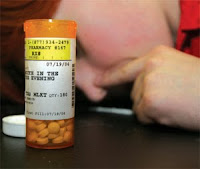Immediately following the verdict in the Conrad Murray trial, I was asked my opinion on the outcome. I think my perspective is probably much different than most peoples’, but as far as the outcome is concerned, I think it is the obvious right one. No doubt, Murray operated outside the protocols of his profession–I mean it’s unfathomable to think his activities were the accepted standards of his specialty.
But I don’t see why what Conrad Murray was doing with Michael Jackson was so shocking. I am quite certain that his practice of providing Jackson with heavy-duty drugs (propofol), literally by acting as the drip-applier, is not uncommon. On the contrary, it’s simply an extreme version of what happens in western medicine every day. But it’s hard for people to understand some of these harsh realities.
To begin with, Michael Jackson was the biggest celebrity in the world. Do not underestimate that power. If he wanted drugs, he was going to get them. Now my personality is such that I probably wouldn’t have done it, if I was in Murray’s position. With the kind of money and power Jackson had, using a drug of that magnitude will never end well, because there could be no limit, no potential end–not when you could raise the stakes well beyond most people’s morality threshold.
However, knowing what every doctor should know about his or her patients, it couldn’t have been too hard for Murray to see how far gone MJ was already. Plain and simple, the whole thing was a disaster waiting to happen.
 So since I am certain that any person with enough money can get whatever they want at anytime, if it hadn’t been Conrad Murray, it would have been someone else. In fact, I know this to be a common rationalization among doctors when pushed to answer why they dispense drugs, even when knowing the drugs will be of questionable value (like prescribing antibiotics for a viral infection). I once asked one of my chiropractic college teachers, who was an MD, why this practice seemed so common among medical professionals, and she answered, “We give a prescription because that’s what the patient wants; we know they’ll just go down the street, otherwise.”
So since I am certain that any person with enough money can get whatever they want at anytime, if it hadn’t been Conrad Murray, it would have been someone else. In fact, I know this to be a common rationalization among doctors when pushed to answer why they dispense drugs, even when knowing the drugs will be of questionable value (like prescribing antibiotics for a viral infection). I once asked one of my chiropractic college teachers, who was an MD, why this practice seemed so common among medical professionals, and she answered, “We give a prescription because that’s what the patient wants; we know they’ll just go down the street, otherwise.”
Exactly…and I’m not knocking it. Like I said before, it wouldn’t be my style, but I totally understand. Listen, when $150K is being waived in your face–per month!–I’m sure you’d think about it too. We can all get moralistic about it, but…well, that’s a lot of money.
But here’s where Murray really screwed up: It appeared to me that he had no emergency plan. He never considered what he would do if precisely this scenario played out. Duh! That became evident when witness testimony came out describing how he acted in the moments immediately following the mishap–he was in a panic!
It seems to me that if you are taking that position–some mega-celebrity’s medical drug dispenser–then you you have got to be prepared for the worst. It’s not a matter of whether the celebrity-druggie is going to die or not, but when. Don’t you prepare for that? I mean…what does the outgoing doctor say, “Don’t worry Conrad, ol’ boy–I’ve been knocking MJ out for a decade. Just give him a hit every four hours–he’ll be cool.”?
Hey, many physicians have done it in the past–think Elvis’ and Anna Nicole’s doctors–and many more will do it in the future. And I think MJ knew he wasn’t long for this world–how couldn’t he? He wasn’t dumb.
Murray, you take a job like that, and you don’t know exactly what you are going to do, or say, if the worst happens? Man, that’s stoo-pid! He probably could have gotten away with it had he taken even the slightest precautions. Arrogance, man…or apathy. I wonder.
No, Murray took a risk that he had to know could go wrong. In light of this, he probably is getting off easy, but it wouldn’t be reasonable to punish him more than for what your average-everyday-doctor is doing to a smaller degree with most of their patients. Had they tried to pin a tougher charge on him, it might have turned out another Casey Anthony fiasco. California prosecutors weren’t going to drop the ball. They got him on involuntary manslaughter for practicing outside the standard of care for his profession, negligence for administering a drug outside of a hospital setting, for not having any monitoring equipment, for failing to call 911 timely, and for failing to keep treatment records. In other words, not much. He won’t do any significant time.
But he won’t get to be a doctor anymore, either. I’m sure that’ll be a serious life transition. But, hey, nothing that can’t be made up for with a best-selling book. Guess we’ll see you on the bookshelves, former doctor Murray.



















